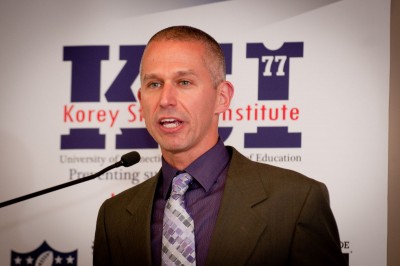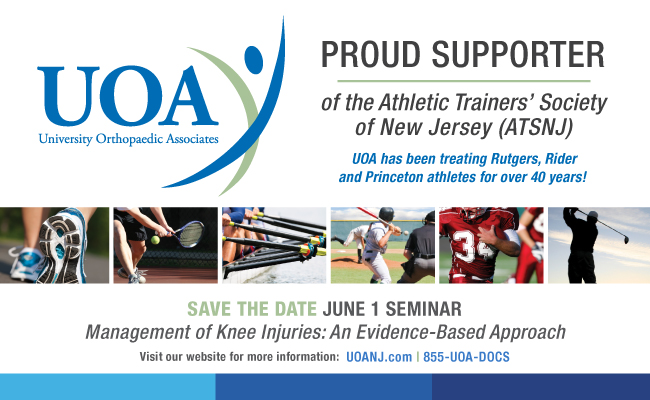
Doug Casa, PhD, ATC
The story that Kent recounts was the seminal moment of my life. I have nearly no memory of approximately 6 hours of my life, while I was in a coma due to severe exertional heat stroke. A few lingering snapshots from those 6 hours dangle inside my mind, which I occasionally see at the oddest of moments. For instance, I remember saying my dad’s work phone number, the only comprehensible item to leave my mouth in the 6-hour span. Why I could recite that number over my home number is still a mystery to me. I still wonder if a call to my dad about my demise would have been better than the news being delivered to my mother. It’s amazing how the mind functions at such stressful times. I also remember\ chaos and worry and desperation surrounding me at one point in the emergency room and the calming sound of a person in charge (who I came to realize later during my hospital stay was the physician in charge of my care). I also oddly remember ice-water towels on me during the ambulance ride and a peculiar combination of oppressive, crushing heat and wonderfully cold water dripping on my chest.
The most important part of my story stems from the night of my collapse. After being released from intensive care to a regular hospital room, I watched the local late-night news at 11:00 P.M. and watched them tell the story of my exertional heat stroke. It was powerful to lay alone (Buffalo was 10 hours from my house on Long Island) in a hospital room -utterly exhausted yet peacefully thankful -and watch a news account about myself. On August 8, 1985, somewhere between 11:00 and 11:10 P.M. EST, the path of my life unfurled in front of me. For all the years since then, I have been on a quest to try to prevent and treat exertional heat stroke. My story is not overly complicated. My survival penance has been to save as many lives as posssible from heat stroke and to prepare others who can do the same. The following story from Benjamin Arthur is one such example of the lives I have been able to touch.
While exertional heat stroke is one of the most common fatalities related to sports, it certainly is not the only one. This book is the culmination of the efforts of more than 30 of the most respected sports medicine professionals and scientists in the world related to preventing sudden death in sports. It is another chance for me to recognize my gift of survival and pay it forward with information about the top 10 causes of death in sport that can assist in creating more survival stories. I have experienced a wide array of emotions in my life, but no feeling is greater than playing a role in saving a life. When you see a person like Ben, whom you helped save, it stops you in your tracks and you realize your life has purpose.
Excerpt from Preventing Sudden Death in Sport and Physical Activity, Edited by: Douglas J. Casa, PhD, ATC, FACSM, FNATA, Publisher: Jones&Bartlett
For Douglas Casa, the opportunity to maximize athletic performance in the heat and prevent sudden death in sport is the culmination of a life-long path; his passion for the study of exertional heat stroke started in 1985 when he suffered an exertional heat stroke while running a 10K race. This experience motivated what has become his life’s cause: the study of exertional heat stroke, heat illnesses, hydration, and preventing sudden death in sport – his ultimate goal is to find ways to maximize performance in challenging circumstances while working prevent needless tragedy during sport and physical activity. “I was fortunate to receive amazing care on-site from the athletic trainer; the EMT’s in the ambulance; and at the hospital from the emergency room physicians and nurses. I only survived because of the exceptional care I received. I was just 16 years old at the time, but I have been driven by this experience since that day,” Dr. Casa explains when asked about what motivates him. He celebrated his 30th anniversary of surviving his exertional heat stroke on August 8, 2015. In April 2010 Kelci Stringer (Korey’s widow), James Gould (Korey’s agent), and the NFL asked Dr. Casa to develop and run the Korey Stringer Institute (KSI) at the University of Connecticut. Korey was an All-Pro offensive tackle for the Minnesota Vikings of the NFL. He died from exertional heat stroke in August 2001. The mission of the KSI (ksi.uconn.edu) is to provide research, education, advocacy, and consultation, to maximize performance, optimize safety, and prevent sudden death for the athlete, warfighter, and laborer. Additionally, he is the editor of a book titled: Preventing Sudden Death in Sport and Physical Activity (2nd edition, 2017), published by Jones & Bartlett in cooperation with the American College of Sports Medicine. His new book titled Sports and Physical Activity in the heat: Maximizing Performance and Safety will be published by Springer in the summer of 2017.
****
For the past 17 years, Dr. Casa has worked toward his goals at the Department of Kinesiology, College of Agriculture, Health, and Natural Resources, University of Connecticut. During this time he has published more than 200 peer-reviewed publications/book chapters and presented more than 400 times on subjects related to exertional heat stroke, heat-related illnesses, preventing sudden death in sport, and hydration. Dr. Casa has successfully treated 225 cases of exertional heat stroke (with 0 fatalities). In October 2005 and 2010 the Department of Kinesiology doctoral program at the University of Connecticut was ranked number 1 in the country by the National Academy of Kinesiology (for 20005-2105). Additionally, in September 2010 the National Research Council ranked the faculty in the Department of Kinesiology number one for research productivity.
Dr. Casa was named full professor at the University of Connecticut in August 2010. In 2008 he was the recipient of the medal for distinguished athletic training research from the National Athletic Trainers’ Association. In 2016 Dr. Casa received the highest honor in his field when he was named a fellow of the National Academy of Kinesiology (FNAK #556). He was named a fellow of the National Athletic Trainers’ Association in 2008. He received the Sayers “Bud” Miller Distinguished Educator Award from the National Athletic Trainers’ Association in 2007 and has been a fellow of the American College of Sports Medicine since 2001. In 2011 he was inducted into the University of Florida alumni hall of fame. He has been a lead or co-author on over 15 sports medicine (ACSM, NATA) position statements/consensus statements/roundtables related to heat illness, hydration, and preventing sudden death. He is an associate editor of the Journal of Athletic Training, Journal of Science and Medicine in Sportsand on the editorial board of Current Sports Medicine Reports, Journal of Sport Rehabilitation, and the Journal of Strength and Conditioning Research. Dr. Casa has worked with numerous media outlets across the country in discussing his research including the NBC Today Show, Good Morning America, ESPN, CNN, PBS, Sports Illustrated, USA Today, Wall Street Journal and the New York Times.
Dr. Casa earned his bachelor’s degree in biology from Allegheny College, in 1990; his master’s degree in athletic training from the University of Florida in 1993; and his doctorate in exercise physiology from the University of Connecticut in 1997. He has been happily married to his wife Tutita Casa, PhD for 21 years and they have 3 kids; Montana (13), Navia (12), and Alessio (11).

